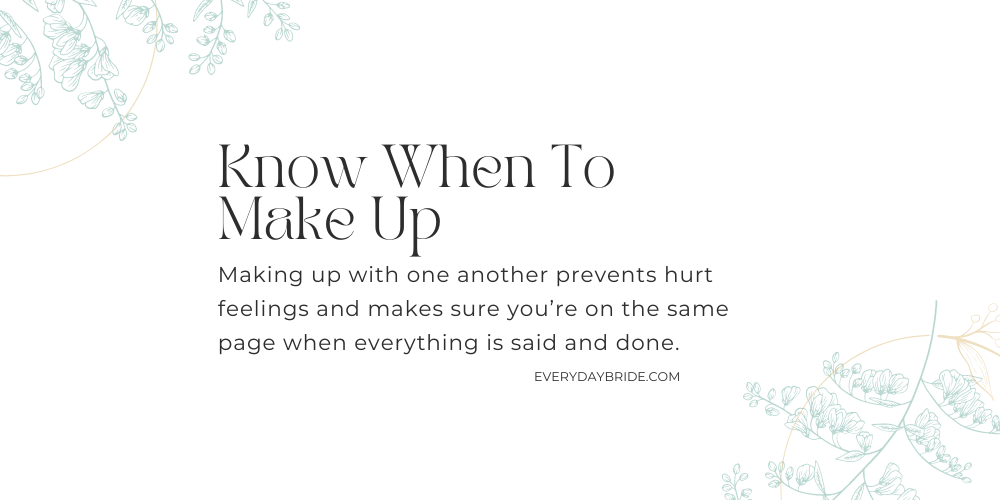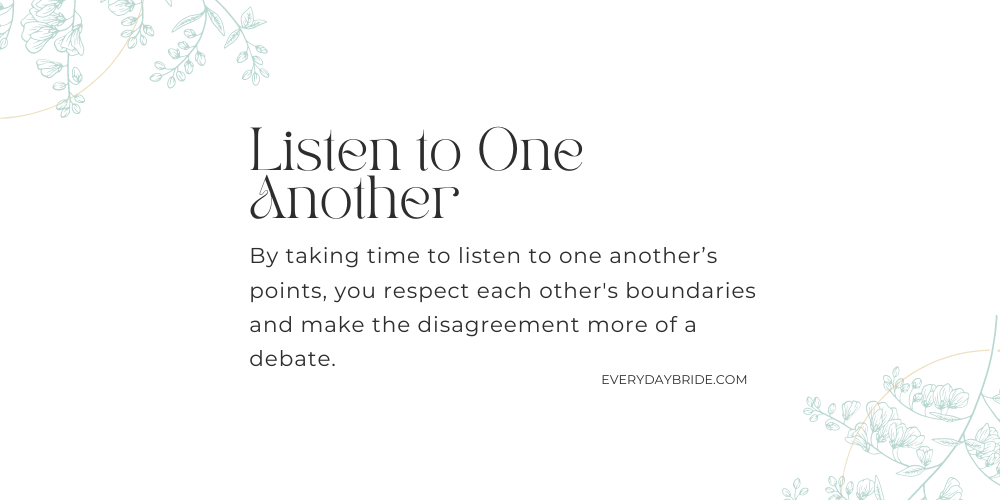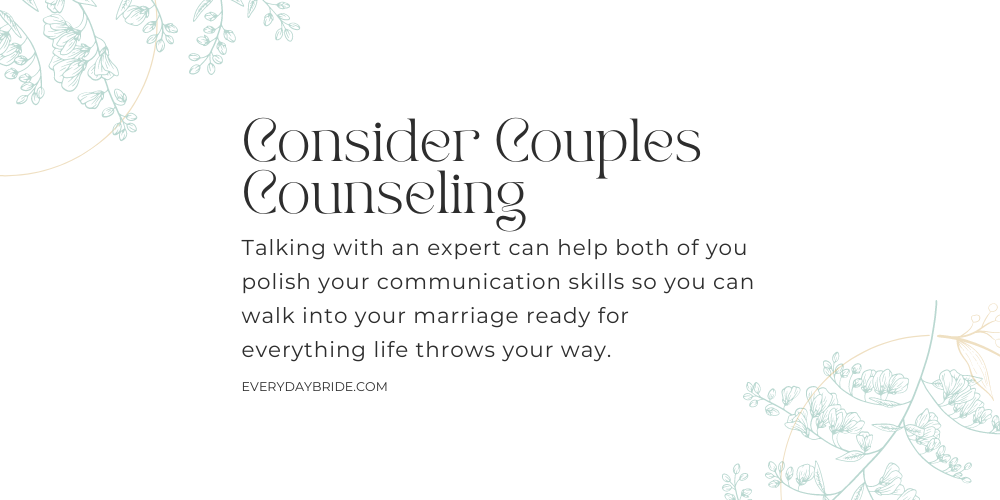Conflict occurs in every relationship, and it’s perfectly normal. Sometimes, having different views than your partner can be healthy and allows both of you to view issues in a new light. Of course, that can only occur if you’re both open-minded and communicate with one another properly. Keep things healthy with these effective conflict resolution tips for newly engaged couples.
Why Conflict Resolution Matters
Depending on your disagreement, it can be easy for an argument to get heated, specifically when it’s about something dear to your heart. However, taking things too personally can lead to hurt feelings or saying things you may not mean. Remember that no disagreement is a personal attack, nor should you take personal blows when you bicker.
In a healthy conflict, you respect one another’s boundaries, which means knowing when an argument is inappropriate. It would help if you didn’t have these conversations in front of others or at special times. And if one partner wants to drop it, it’s time to wrap it up, cool off, and have a conversation later.
So why is conflict resolution so important? Because it prevents those boundaries from getting crossed. And constructive conflict can allow both of you to see the topic of conversation in a new light, which can lead to new ideas. Likewise, healthy disagreements can enhance communication because you will better understand one another’s thoughts.
Healthy vs. Unhealthy Conflict
We’ve talked a lot about healthy conflict, and some of you may wonder how that differs from unhealthy. After all, a disagreement is a disagreement. Isn’t any argument bad? Not exactly. Holding different views from your partner is natural because we’re only human and have other belief systems. Bickering is healthy if you both have a voice and easily make your points. There’s no shouting or hurt feelings.
An Example
Let’s say the two of you disagree on the perfect venue for your wedding. While you want to get married on the roof of a skyscraper with a city backdrop, your partner may want to have an indoor reception at a conservatory. Both views are valid, and you should treat them this way. In a healthy disagreement, you’ll listen to one another’s points and decide as a team on a spot you both like—you should both win.
Top Ways To Resolve Conflict
Knowing why conflict resolution is important to your relationship is one thing but knowing how to carry it out is another. Some of the most effective conflict resolution tips for newly engaged couples consist of the following:
• Listen to one another
• Keep your mind open
• Keep it on one issue
• Decide if the conflict’s worth it
By following these tips, you’ll keep things moving in a constructive manner where both of you feel heard. And by the end, it will be easier to come up with the appropriate solution.
Listen to One Another
Both of you should have a voice in the disagreement, so rather than try to talk over one another, take turns talking. You should each get to vocalize your thoughts and opinions. By taking time to listen to one another’s points, you respect each other boundaries and make the disagreement more of a debate.
Doing things this way allows the two of you to get to the root of the problem. Let’s reevaluate our example of a wedding venue. Are the issues really about aesthetics or something more? One location may be more open while the other feels more intimate, reflecting different ideas for the wedding.
Find the Middle Ground
You’re a team, and the two of you need to find a way to meet in the middle. This may mean one of you decides to compromise, or you may give up your idea to find something you both agree on. For instance, with that venue, you could instead search for an indoor area that you decorate with greenery; it may also have big windows with a view of the city. Doing this allows both of you to win.
If one of you compromises on one detail, the other person should do so on another. Things don’t feel fair when the same person always gets their way.
Keep Your Mind Open
No matter how strongly you believe in your side, keep your mind open so you truly listen to your partner and vice versa. Doing otherwise makes the entire discussion pointless because you won’t find a true middle ground. Put yourself in one another’s shoes to negotiate a solution together.
Keep It to One Issue
In your discussion, stick to the current topic of conversation. When you start bickering about multiple things, finding your middle ground on the issues is harder. You can solve various problems at separate times, but it needs to move step by step, like a choreographed dance. Sometimes, you may need to momentarily end the conversation and set a time to come back to it with a list of resolutions.
Decide if the Conflict’s Worth It
You need to decide which hills are worth dying on and which issues you can move past. Whether you disagree on a detail about your wedding, a belief, or another aspect of life, you should decide how important it is. Is arguing about it really worth the energy? What do you and your partner gain from disagreeing? Your opinions are perfectly fine, but if the two of you can’t find a middle ground, it may be worth agreeing to disagree on the topic.
Don’t Blow It Out of Proportion
When you ask yourself which disagreements are worth it, be honest with yourself. Yes, these are your beliefs and thoughts, but that doesn’t make the argument a personal matter. And during a conflict, avoid making personal remarks or targeting your partner as an individual. Rather than saying, “How could you think that?” try saying, “Why do you think that?” Asking “why” allows you to better understand each other on a fair playing field.
Know When To Make Up
Once you’ve found your middle ground or dropped the issue, it’s time to kiss and make up. Crack a joke about the situation or spend some cuddle time on the couch. Making up with one another prevents hurt feelings and makes sure you’re on the same page when everything is said and done.
Working as a team makes it easier to find ways your partner can help you plan the wedding. As they dive into the preparations, they may come up with their own ideas for things, and since you’re sharing the spotlight, you both need to listen.
Don’t Go to Bed Angry
As cliché as it is, avoid going to bed angry with one another. Holding on to resentment can allow those negative feelings to bubble up, and you may catastrophize the situation. Like a rubber band, the tension will build up until someone snaps; this can lead to an argument that’s bigger than it should be.
If you need to step away to collect your thoughts, that’s fine. Take a deep breath and jot down what you think if you need to, then have a conversation with your partner when you both feel ready.
Consider Couples Counseling
Marriage counseling can sound like a dark mark on the relationship—a taboo that no couple wants to rely on—but that’s far from the truth. You’re going through an enormous change. It can mean changing your daily routine or style of living, especially if you move in together for the first time.
Talking with an expert can help both of you polish your communication skills so you can walk into your marriage ready for everything life throws your way. Your first year is when you build the foundation for your life together.
The two of you will disagree on things throughout life as you do things like buying a home, raising children, and reaching other amazing milestones. This is normal. By knowing how to handle those disagreements, you can ensure your love is always flourishing. Enjoy your exciting and romantic journey together!






